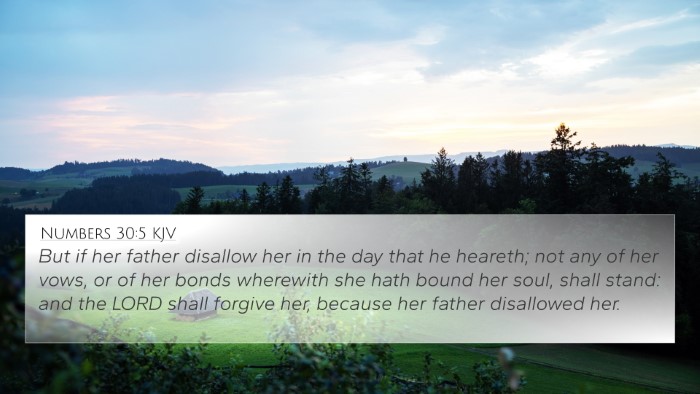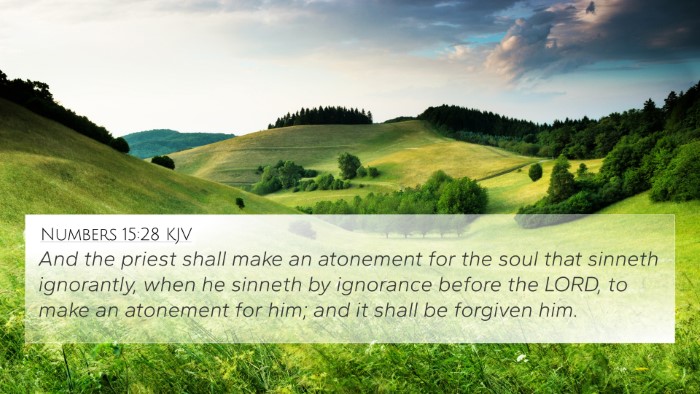Understanding Numbers 30:12
The verse Numbers 30:12 discusses the binding nature of vows and oaths within the context of God’s commandments. It highlights the seriousness with which promises should be made and maintained, especially within the covenant community of Israel.
Verse Text
Numbers 30:12 (KJV): "But if her husband hath wholly made them void on the day he heard them; then whatsoever proceeded out of her lips concerning her vows, or concerning the bond of her soul, shall not stand: and her husband hath made them void; and the LORD shall forgive her."
Context and Background
This chapter deals with the law regarding vows and oaths, particularly concerning women and their autonomy in making vows. It emphasizes the role of husbands in voiding the vows of their wives, reflecting a patriarchal society's views on authority and responsibility.
Key Insights from Commentaries
- Matthew Henry: Henry emphasizes the importance of vows in the life of the believer and how they should be approached with reverence and care. He notes that a husband’s authority to nullify his wife’s vow is meant for the protection of a woman from rash promises that could lead to her harm.
- Albert Barnes: Barnes provides a more detailed analysis of the societal implications of the verse, stating that this law protected women from making vows that might be burdensome or contrary to their lives. He reflects on the idea of mutual responsibility within marriage.
- Adam Clarke: Clarke focuses on the theological implications, suggesting that the passage reveals God's desire for order and structure within familial and societal relationships. He notes how God's law upheld the sanctity of vows and affirmed the authority of the husband while ensuring a means for reconciliation.
Thematic Connections
Numbers 30:12 can be connected to various themes and concepts found throughout Scripture, offering rich avenues for cross-referencing and comparative analysis:
- Vows and Promises: Deuteronomy 23:21-23 discusses the importance of fulfilling vows to the Lord.
- Authority in Relationships: Ephesians 5:22-23 discusses the dynamics of authority and submission within marriage.
- Forgiveness and Restoration: 1 John 1:9 emphasizes God's willingness to forgive those who fail to fulfill their vows.
- Impact of Words: Proverbs 18:21 speaks to the power of the tongue in creating life or death in our commitments.
- God's Instruction for Community Living: Leviticus 5:4 describes situations wherein someone might think to make a vow, highlighting the seriousness of such commitments.
- Judgment and Accountability: Ecclesiastes 5:4-7 warns against the hasty making of vows before God.
- Mercy and Compassion: Matthew 5:37 teaches about honest speech, encouraging a heart that is truthful in its commitments.
Cross-Referencing Insights
In studying Numbers 30:12, it is useful to examine the following cross-references that elucidate the themes of vows, authority, and forgiveness:
- Deuteronomy 23:21-23 - Following through on vows to God.
- Ephesians 5:22-23 - The structure of authority within marriage.
- 1 John 1:9 - God's forgiveness for broken promises.
- Proverbs 18:21 - The power of words and commitments.
- Leviticus 5:4 - Discusses making vows and their implications.
- Ecclesiastes 5:4-7 - Cautions against thoughtless vows before God.
- Matthew 5:37 - Encouragement to speak truthfully in commitments.
Practical Application
Understanding Numbers 30:12 encourages readers to reflect deeply on the vows they make, whether in a personal or communal context. Here are a few practical applications:
- Consider the seriousness of promises made to God and to others.
- Encourage open dialogue in relationships about commitments and their implications.
- Seek God's guidance before entering into significant commitments.
- Practice forgiveness within relationships, being mindful of the imperfection of both parties.
Conclusion
Numbers 30:12 serves as a solemn reminder of the sacredness of our vows and the relational responsibilities we carry. By engaging with this text alongside related scripture, we can gain a deeper understanding of the intricate web of promises within the Biblical narrative.







